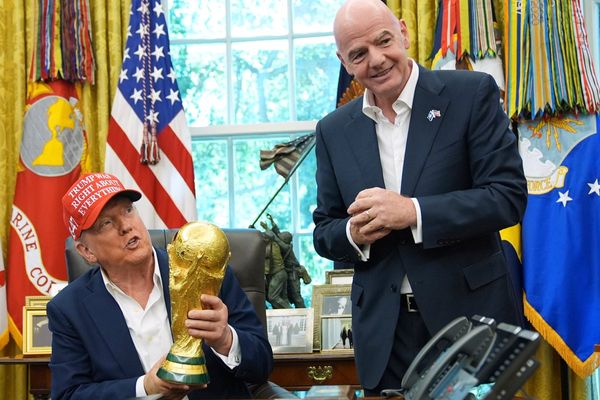
Not all that long ago, that first half hour would have done the Americans in.
The United States men’s national team started Tuesday’s friendly with Australia looking flat, lacking spark, unable to find their way through the press. They gave away a soft, sloppy goal on a series of defensive miscues – off a throw-in no less. It was the eighth time in Mauricio Pochettino’s 20 matches in charge that the US fell behind. They had never salvaged a win from the previous seven and gotten only two ties. Then they lost Christian Pulisic to injury when he felt his hamstring pull.
Then, the Yanks got their acts together.
There was a swerving warning shot from Tim Weah. And then a Haji Wright goal in the 33rd minute on a lovely through ball by Cristian Roldan, poking a tidy finish past Maty Ryan. Some chippy late Australian tackles that failed to rattle the Americans. And then, in the 51st minute, Wright’s second goal – the Coventry City man’s 11th in 11 matches for club and country, bringing the game to its final: 2-1.
The US had chances to run up the score. Roldan had a few close efforts. Diego Luna was denied point-blank by Ryan. Aidan Morris had a late chance off a mazy dribble but rolled his finish wide.
The gutsy turnaround combined all of the things Pochettino has been demanding to see. In beating an Australia side that had not lost in a dozen games, the US got tougher, nastier, feistier. They got into scuffles when they needed to assert their presence. They played their own game on their own terms.
Call it Pochismo, a term floated in a recent press conference, to the affable Argentine’s delight. Or call it Poch-ball if you hate fun. Call it culture, which Pochettino has been talking about a lot in the last few days, and how it eats strategy for breakfast – an aphorism coined by management guru Peter Drucker, because modern soccer managers love few things as much as borrowing corporatese.
It was fitting, then, that the introduction of Luna for Pulisic should coincide with the turning of the tide – without meaning to suggest that correlation is causation here. Luna has become a poster boy for Pochismo; A fiery sparkplug unafraid to take the game by the, well, let’s say scruff – although Pochettino might choose a different bit of anatomy in private.
In Wright and Roldan, erstwhile depth players stepped forward and will now make for uncomfortable crowding on the depth chart. That, too, was something Pochettino had hoped to see when he rotated six players out of his lineup after Friday’s 1-1 tie with Ecuador.
“Players that can maybe tomorrow have the opportunity to perform and say, ‘Hey, be careful because I am knocking on the door and I can be there also in the World Cup,’” the head coach said of the changes before the game.
Suddenly, the Americans have gone from a dearth of productive strikers to a glut of them. Folarin Balogun has looked imperious in recent games, with the England-raised Monaco man looking like he could grow into the best striker this nation has had in at least a decade, if not several of them. Now, on the back of Haji Wright’s brace, there are options.
“That is what we expect when we give the opportunity to the player,” Pochettino added afterwards. “That is good news.”
Roldan, likewise, has elevated himself from the consummate glue guy to a man who might be cast for a leading role. Aside from his two assists on the night, Roldan was imperious in the middle of the park, often at the center of important plays on both sides of the ball.
“It’s what we need,” Pochettino said of the Seattle Sounders stalwart. “We need players with confidence, with self-belief, with a little bit of arrogance, a little bit of being naughty, being competitive. Maybe Cristian Roldan is an example of how, if you want to build your perfect player, he has a little bit of everything.”
Over the course of a team’s construction on the way to a World Cup, a loss can sometimes spark a kind of momentum. At the 2009 Confederations Cup, the US were hammered 3-1 by Italy and 3-0 by Brazil in the group stage, yet stuck together and worked out how to mend themselves. The Yanks snuck into the semi-finals and beat a Spanish juggernaut to advance to the final, where they held a 2-0 lead over Brazil, before giving it away. That laid the foundation for a successful tournament in South Africa in 2010.
During qualifying for the 2014 in edition, the Americans lost 2-1 in Honduras, whereupon a bombshell story in the Sporting News, wherein players tore into head coach Jürgen Klinsmann, threatened to derail their progress to Brazil. It didn’t. The Americans went on a long unbeaten run from there and then survived the group of death at the World Cup.
This generation, meanwhile, suffered the shock of going through Concacaf World Cup qualifying for the first time in the late summer of 2021 with a scoreless tie in El Salvador, a home draw with Canada, and a half-time deficit in Honduras. Then, finally, they worked up the requisite intensity and unlocked a berth in Qatar without much more drama.
A 2-0 loss to South Korea in New Jersey on 6 September might have been just such a moment for the current USMNT.
The turnaround was already apparent in the second half, when the US changed formation and outplayed their opponents, even if the scoreboard remained unchanged. They beat Japan 2-0 three days later, relieving some pressure at last.
Against Ecuador on Friday, the US looked sharp, organized and creative in the absence of Antonee Robinson, Sergiño Dest, Tyler Adams and, for most of the game, Pulisic. The Yanks matched South America’s second-best team in World Cup qualifying for a 1-1 tie.
“After one year, I am so, so, so happy that we don’t talk about other things like commitment, attitude or things like this that normally in the past we were talking [about],” Pochettino proclaimed then. “I think that is a massive step up. It’s a thing that we need to forget and always win or lose depend[ing] on our performance. [If we don’t win], it’s a soccer problem and not another problem.”
There have been a lot of those steps up for the US in the last six weeks. While Pochettino continues to take the long view, carefully managing minutes and niggling injuries, trying out players, formations, and pairings, his team is amassing a tangible momentum.
“Progression is progression,” Pochettino said this week. “It’s difficult to measure. If you feel the progression, I think it’s good.”
At long last, with just two camps remaining before the US assembles for a second World Cup on home turf in May, the Americans are feeling something.
Leander Schaerlaeckens’ book on the United States men’s national soccer team, The Long Game, is out in the spring of 2026. You can preorder it here. He teaches at Marist University.







